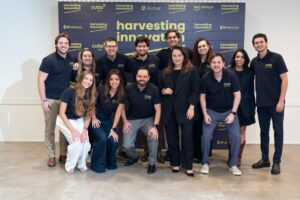Conservis Joins Western Growers’ Innovation Center
Ag data management company Conservis Corp has opened an office in Salinas, California, expanding its North American operations to the West Coast. The new office is located in the Western Growers Center for Innovation and Technology in Salinas, will help Conservis collaborate with affiliated agtech startup experts and like-minded entrepreneurs associated with the Center. Conservis first offered solutions for the tree nut market in 2014 in collaboration with California orchard management company, Pacific Gold Agriculture. Through its software service, Conservis offers real-time insight into day-to-day operations, enterprise resource planning, harvest tracking and maximizing profitability are all added benefits tree nut growers receive when utilizing Conservis.
Costco Offering Loans to Organic Farmers to Keep up with Demand
Organic products are flying off the shelf at leading US retailer Costco. To keep up with the mushrooming demand, Costco is now offering loans to organic farmers for land and equipment purchases. The store has recently climbed to the top of the organic charts, selling $4 billion in organic produce annually. This figure surpasses even health food store Whole Foods. Through its new financing program, it’s already helped a San Diego-based farm acquire 1,200 acres of Mexico farmland in addition to new equipment to cultivate it. As part of Costco’s return on its investment, it gets first dibs on the produce harvested from the Mexico farmland.
50 Billionaires on Forbes 400 List Receive Farm Subsidies
The Environmental Working Group, a non-profit, non-partisan consumer watchdog organization, reports that fifty members on the Forbes 400 list are recipients of federal farm subsidy payments. These subsidies are provided to farmers to help moderate the price of agricultural commodities, supplement farmers’ incomes, and adjust supply and demand. Commodities eligible for farm subsidy payments include peanuts, cotton, soybeans, and feed grains like corn among others. According to EWG, between 1995 and 2014, some of the wealthiest residents in the US received at least $6.3 million in payments. Banking magnate David Rockefeller Sr, Wall Street king Charles Schwab, and Microsoft co-founder Paul Allen were among the rich recipients called out by EWG. Read more here.
Countdown to Vermont’s GMO Labeling Law: 70 days
With Congress still unable to reach a compromise on a federal GMO labeling bill, food companies are likely well underway figuring out what they must do to come into compliance with Vermont’s impending mandatory GMO labeling law, which takes effect on July 1, 2016. Meanwhile, Vermont’s attorney general William Sorrell has requested that major seed and food producers hand over internal research about their GMO crops. The AG filed a number of motions in several federal courts across the country. The motions are part of an ongoing legal challenge that the Grocery Manufacturer’s Association filed against the AG challenging the state’s impending mandatory GMO labeling law, which will take effect July 1, 2016.
Farm Bureau Pres Calls for More USDA Research Funding
American Farm Bureau Federation president Zippy Duvall published an op-ED this week in The Hill calling for Congress to approve the full amount of funding allocated for USDA’s Agriculture and Food Research Initiative grants in President Obama’s 2016-2017 fiscal budget. So far, appropriators in the House have only provided a $25 million boost. Green-lighting the full amount would double the appropriations allocated to AFRI grants in FY 2016, which totaled $350 million. According to Duvall, the myriad list of problems plaguing farmers warrants the hearty bump in funding. He also called out the stagnant funding history for USDA research programs, stating that the funding dollars have grown only 0.2 percent in the last 10 years. Read Duvall’s piece here.
Nestle to Source Simpler Ingredients
Consumers have become much noisier when it comes to reading ingredient information on food packages. As a result, some suppliers are swapping out synthetic ingredients for their natural counterparts. Major packaged goods provider Nestle is updating the ingredient lists for six of its ice cream products as part of a multi-year plan to update its product formulations across various segments. The changes include removing GMO ingredients, high fructose corn syrup, and artificial colors and flavors.
Swapping out a synthetic for something else isn’t always easy. In January 2016, General Mills embarked on a mission to reformulate its cereal products to exclude artificial colors and flavors. So far, a number of cereals have gotten a makeover, including Trix, Golden Grahams, and Reese’s Puffs. Scientists are stumped, however, when it comes to finding natural colors to shade the rainbow-hued marshmallows in Lucky Charms that don’t compromise the classic breakfast fare’s flavor.
Other News That’s Fit to Chew:
- Taco Bell has launched a program to limit its use of antibiotics that are important to human medicine from the chicken it serves, said the company in a statement. KFC, owned by the same parent company as Taco Bell, is also modifying its antibiotic practices, but only slightly. The fast food chain will only use antibiotics to treat chickens that are sick and prevent illnesses, which is the current FDA-required policy. Check out the list of institutional investors pressuring other companies to follow suit.
- Keurig, the manufacturer of a single-cup coffee and beverage serving machine, has introduced an environmentally conscious version of its infamous K-cup packs which got the company into some hot water last year when reports surfaced that the plastic pods were not recyclable.
- Temple Grandin, the animal scientist who revolutionized the livestock industry, has been elected to the American Academy of Arts and Sciences, a national organization for scholarship, civil dialogue, and knowledge in arts and sciences.
- Genetically engineered mosquitoes are creating quite the buzz when it comes to battling the Zika virus. The GE insects have also been used to help farmers combat the insects’ devastating impact on brassica crops.
Have news or tips? Email [email protected]





